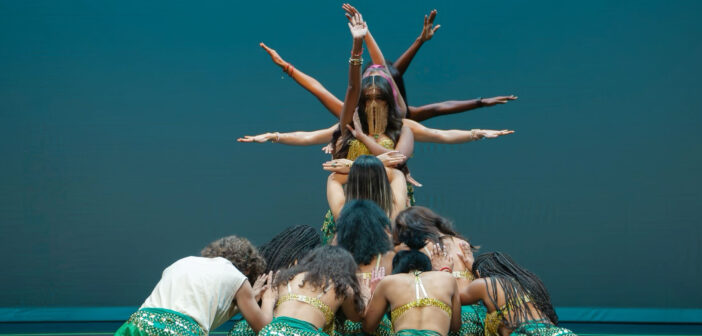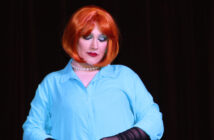Whether studying in the classroom, advocating for gender inclusivity at the Center for Gender Equity or belly dancing on stage, Retika Barua, ‘24, can be found pursuing a range of interests around Lehigh’s campus,
While other seniors may be clinging onto their final moments at Lehigh before their commencement on May 19, Barua eagerly anticipates the next chapter of her life after graduation.
Barua is majoring in clinical psychology with a minor in religion studies. She’s been working as an assistant at the Center for Gender Equity for the past four years and is a member of the African Renaissance Dance Team and the Belly Dance Team.
At the Center for Gender Equity, Barua works as an equity representative. While the mission of the center and the role of those involved change from year to year, she said her job is to hold workshops surrounding gender inclusivity and spirituality.
Azalea Chacón, a coordinator at the Center for Gender Equity, said Barua has made significant contributions to the center, which include hosting “Healing with Tika” events or painting canvases as an equity rep.
Chacón said Barua’s leadership qualities are evident in the connections she has built across her many clubs and activities.
“I feel like in a lot of projects that we’ve seen her in, she always has a community around her,” Chacón said.
When showcasing her dance skills in the African Renaissance Dance Team and Belly Dance Team, Barua said she loves seeing creative ideas come to life.
“I love the fact that my creativity is respected,” Barua said.
Barua is also a member of the executive board of both dance teams and meets with the other members of the boards twice a week for four hours. While she said her involvement in the clubs became more serious after joining the boards, she has become extremely close with her teammates.
“After a while, they’re not even friends, they’re family,” Barua said. “It’s like I have two big families to always come to and debrief on. There is a lot of stress, of course. Being a leader is not easy when people want to have fun, but it’s the sisterhood and family that makes you want to keep going.”
Sarah Campos, ‘25, is the current president of the Belly Dance Team and fondly remembers her first encounter with Barua. Two years ago, before performing at the Asian Student Association’s culture night, Barua and Campos got to know each other by collaborating on the choreography and audio for the team’s performance.
“I had never met someone who had the same passion for (dance), and she even helped me cultivate that passion and helped me see that there is more than one style of belly dance,” Campos said.
With graduation only a few weeks away, Barua is already setting her sights on what’s next. As for the near future, Barua is looking to work at the Mount Sinai Health System in New York City shadowing a clinical researcher. But in the long term, she wants to help her community and emphasize the importance of mental health.
“During college, I was trying to help people think about their well being and help them look for methods to work on the things that affect their well-being,” Barua said. “I hold spirituality workshops where we implement meditation as a form of intervention to some of our psychological complications that we may have.”
Barua hopes to get her master’s in clinical psychology, and once achieved, she will apply her knowledge to the real world.
While she said she hopes to be in a job position in the future where she can prescribe medication to those who need it, Barua’s biggest goal is to not have to. Instead, she believes in natural remedies, like mindfulness, exposure therapy and wilderness therapy.
Barua said growing up unprivileged and not having much led her to pull resources from within and around her.
“Everybody has trauma,” Barua said. “Finding a way that makes them feel unique and makes them feel like this is their life. This is the Retika way, and just finding something that speaks to your character archetype.”
For Barua, the Center for Gender Equity and her dance groups are a symbol of her hope and faith.
“In the beginning of my college career, I didn’t really have much,” Barua said. “I was stranded from home, and it was so difficult for me to settle in a (predominantly white institution) being a (person of color) low socioeconomic status-identifying woman. I felt a lot of strangeness because I just didn’t feel there were many people who were similar to me.”
Barua said once she became involved in her various campus communities, she found the people in these spaces, even if they didn’t share the same identity as her, had the same spirit as her. She said this realization was very important to her.
“It was a sign of hope that everything is going to be okay,” Barua said. “It gave me a sense of belonging that other spaces couldn’t give me.”
With four successful years at Lehigh behind her, Barua’s peers within her dance teams and the Center for Gender Equity agree she will leave a lasting impression.
“She is always going to be my favorite belly dance partner,” Campos said.






Comment policy
Comments posted to The Brown and White website are reviewed by a moderator before being approved. Incendiary speech or harassing language, including comments targeted at individuals, may be deemed unacceptable and not published. Spam and other soliciting will also be declined.
The Brown and White also reserves the right to not publish entirely anonymous comments.